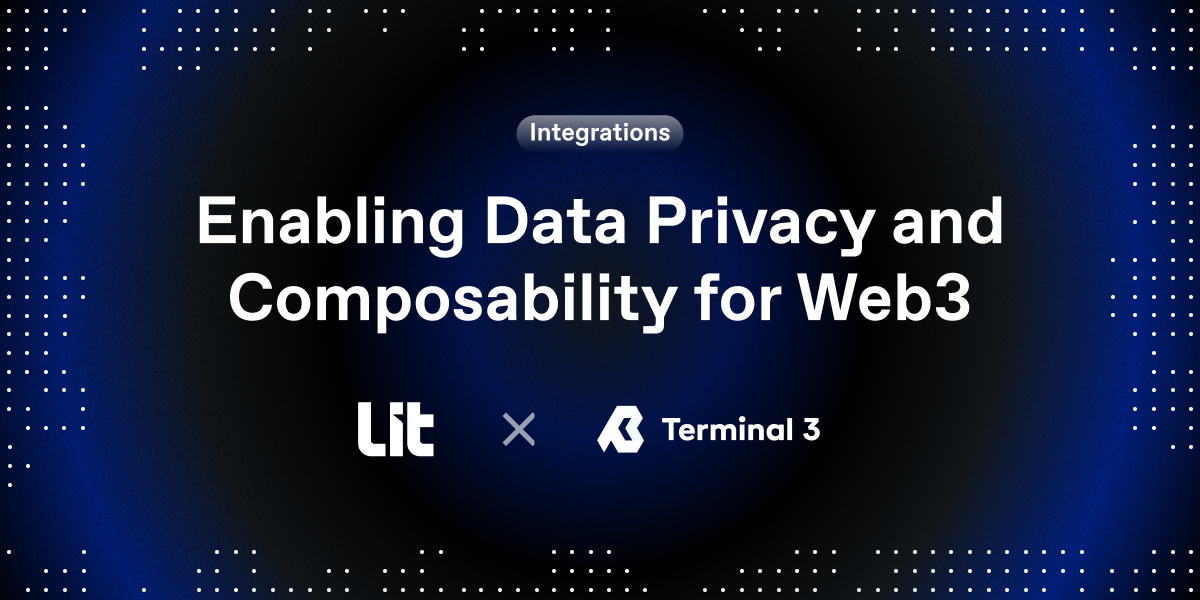Terminal 3 x Lit: Enabling Data Privacy and Composability for Web3
Learn how Terminal 3 and Lit can be used together to provide users of the web with greater control over their personal data.

Terminal 3 is a data freedom platform that enables fully private user data to be freely composable. We provide self-sovereign data storage, verifiable credentials, and privacy-preserving data access as an alternative to the non-compliant solutions that enterprises rely on today. We are excited to be a part of the Lit v0 launch, as our partnership with Lit Protocol guarantees that user data is stored securely while enabling users to retain full control.
About Terminal 3
The next generation of internet users expect greater anonymity, privacy, and digital ownership as they travel the web, while global data privacy laws and regulations become more stringent, and enterprises face growing security concerns, costs, and compliance fines. At the juncture of these three concerns is an urgent need to reimagine how user data is stored, used, and transferred around the world. At Terminal 3, we believe that user data should be self-sovereign and fully controlled by users, be secure and private, yet remain fully composable in Web3.
To do this, Terminal 3 has created a platform that takes user data from any application and:
- Enriches, standardizes, and encrypts data;
- Atomizes and stores data in a decentralized fashion; and
- Processes data for enterprise use via zero-knowledge cryptography.
Lit Protocol is an important part of Terminal 3’s architecture. Together with Lit, we are able to give users back full control over their own personally identifiable information (PII) and create a brand new data economy that protects user privacy while still empowering enterprises to make data-driven decisions.
Our Use of Lit Protocol
Securing User Data
With data breaches on the rise, regulators closing in, and Web3 users expecting privacy, it is important that any user data collected is stored in a secure, privacy-compliant, and decentralized environment. Terminal 3 uses Lit Protocol as a distributed encryption and key management layer that aids in all of the above.
Similar to conventional asymmetric encryption, where a public and private key are involved, Terminal 3 encrypts user data on the client-side using a public key while the decentralized Lit Network (to which we belong as a node operator), manages portions of the corresponding private keys. No single Lit node possesses the entire private key, introducing an additional layer of security. The encryption process employs an innovative approach known as "identity-based" encryption, a frontier technology in the field of cryptography. This method utilizes a decryption key derived from a Boneh-Lynn-Shacham (BLS) signature that is based on the identity parameter—a combination of the data's hash and the specified access control conditions. The nodes within the Lit Network validate these conditions, compute the identity parameter using the hash of the data and conditions, and perform a threshold signing with the BLS private key. The resulting signature functions as the decryption key unique to each user's profile.
To prevent collusion between nodes and unauthorized assembly of the signature (decryption key shares), the Lit nodes operate within a trusted execution environment (TEE) facilitated by a bare metal integration with AMD's Secure Encrypted Virtualization (SEV). This security measure ensures that the nodes provide cryptographic proof that they are executing unaltered code, and it prevents them from accessing or reading their segment of the private key. These signature shares are then transmitted to Terminal 3, where decryption transpires exclusively on the client's side. Meanwhile, the encrypted data is held on the InterPlanetary File System (IPFS), upholding our commitment to security and decentralization.
Furthermore, the Lit Protocol enhances our system with the essential capability of key revocation: the capability for users to autonomously revoke access, including the authority to rescind Terminal 3's permissions. This means that the complexity and need for an additional encryption layer for sharing data with external parties is no longer necessary, simplifying the process while maintaining security and privacy for the user.
Controlling Data Access
With Terminal 3, users know that unless there is a regulatory action, no one will see, copy, or store their data without their permission. Their data is fully encrypted in decentralized storage, and it is entirely up to the user whether or not they want to share their identity with any given platform.
Lit Protocol powers this functionality through Decentralized Access Control. Users can set their own Access Control Conditions (ACCs) that grant or revoke access to their encrypted data by any third party. These conditions are decentralized and can only be updated on-chain by the user, meaning users are fully in control of what others can see.
Conclusion
With Lit Protocol enabling client-side encryption, decentralized key management, and trustworthy data access control, Terminal 3 can go the extra mile to make sure that your data works for you. For example, even when users choose to share some information, enterprises can only query against that data using zero-knowledge APIs. Full details like birthdays, email addresses, and ID numbers will never be revealed.
Our integration with Lit Protocol means that your data really is your data. Terminal 3 is excited to explore how to further that mission together with Lit Protocol, and we are thrilled to be participating in the launch of Lit v0.
We’re building towards a future of data freedom. Learn more about our vision on our website.
Resources: Terminal 3
Website: https://www.terminal3.io/
X: https://twitter.com/terminal3io
LinkedIn: https://www.linkedin.com/company/terminal3io/
Blog: https://sowhat.terminal3.io/
Resources: Lit Protocol
💻 Developer Documentation: https://developer.litprotocol.com/
👾 Discord: https://litgateway.com/discord
🧑💻 GitHub: https://github.com/LIT-Protocol
🆇 X: https://twitter.com/LitProtocol
🖥 Website: https://litprotocol.com/
